Minister of Finance (New Zealand)
The minister of Finance (Māori: Minita mo nga Moni), originally known as colonial treasurer, is a minister and the head of the New Zealand Treasury, responsible for producing an annual New Zealand budget outlining the government's proposed expenditure. The position is often considered to be the most important cabinet post after that of the prime minister.[2]
| Minister of Finance | |
|---|---|
 | |
 | |
| The Treasury | |
| Style | The Honourable |
| Member of | |
| Reports to | Prime Minister |
| Seat | Wellington |
| Nominator | Prime Minister |
| Appointer | Governor-General of New Zealand on the advice of the prime minister |
| Term length | At His Majesty's pleasure |
| Formation | 3 May 1841 |
| First holder | George Cooper as Colonial Treasurer |
| Salary | $288,900[1] |
| Website | www.beehive.govt.nz |
 |
|---|
|
|
The current Minister of Finance is Grant Robertson. There are also three associate minister roles; they are currently held by David Parker, Megan Woods, and Barbara Edmonds.[3]
Responsibilities and powers
One of the Minister of Finance's key roles involves the framing of the annual year budget. According to Parliament's Standing Orders, the Minister of Finance may veto any parliamentary bill which would have a significant impact on the government's budget plans. The Minister of Finance supervises the Treasury, which is the government's primary advisor on matters of economic and financial policy.[4] As such, the Minister of Finance has broad control of the government's spending, making the position quite powerful.
Some analysts, such as Jonathan Boston, claim that the Minister of Finance can sometimes hold more influence than the Prime Minister, if the conditions are right. Gordon Coates, Finance Minister in the early 1930s, was sometimes such a figure. Some political scientists, such as Boston, believe that in the government of David Lange, Minister of Finance Roger Douglas held more power than was proper, and that the Treasury was using its control of government finances to take a supervisory role across the whole administration. It was probably for this reason that Lange's successor, Geoffrey Palmer, established the Department of the Prime Minister and Cabinet, which could offer the Prime Minister advice independent of that given by individual ministers.
History
The office of Minister of Finance has existed since 1841.[5] Apart from the office of Prime Minister itself, the only other cabinet posts to have existed since the first cabinet are those of Attorney-General and Minister of Internal Affairs. Originally, the holder of the post was designated "Colonial Treasurer", but this term was replaced with "Minister of Finance" shortly after New Zealand ceased to be a Colony and became a Dominion. This occurred in 1907, during the cabinet of Joseph Ward.
In the past, several Prime Ministers took on the post of Minister of Finance themselves, though in recent times this practice has declined. Robert Muldoon, the last person to concurrently serve as Prime Minister and Minister of Finance, created considerable controversy by doing so. It is more common, however, for a Deputy Prime Minister to serve as Minister of Finance. Bob Tizard, Michael Cullen, Bill English and Grant Robertson served as Deputy Prime Minister when in the position as Minister of Finance.
Traditionally Ministers of Finance rank second or third in seniority lists within Westminster-style Cabinets, although initially Harry Lake was ranked at sixth and his successor Robert Muldoon was ranked at eighth; both because of their short service to date in Parliament, and because Keith Holyoake saw Muldoon as too arrogant and ambitious for his own good.
The convention of making a second, more junior appointment in the Finance portfolio began with Holyoake, who appointed Muldoon as an Assistant Minister to Lake shortly before the latter's death in 1967.[6] Some successive Prime Ministers made similar appointments of an Associate Minister of Finance (for example, Marshall and Kirk) but this was not always done (Rowling, for example, who had Mick Connelly as his associate while serving as Finance Minister did not appoint an associate Minister after succeeding to the premiership in 1974).[6] Associate appointments became standard when Muldoon served concurrently as both Prime Minister and Finance Minister.[7] In his second term, Muldoon appointed both a Deputy Minister of Finance (Hugh Templeton) as well as an associate Minister (Derek Quigley). Muldoon's successors Lange and Palmer continued to have a three-strong Finance team, each appointing two associate Ministers to support their respective Ministers of Finance.[6][7] At times, the appointment of associate ministers was intended to temper the reform ambitions of Roger Douglas.[7]
In the coalition governments formed in 1996 and 2017, responsibility for Finance was shared between the parties. After the 1996 elections, the role of the Minister of Finance was formally split between two portfolios – that of Minister of Finance and that of Treasurer. The position of Treasurer was senior to that of the Minister of Finance, and was created as part of the coalition agreement between the National Party and New Zealand First. It was established especially for Winston Peters, leader of New Zealand First, who demanded it as part of the deal. When Peters ended the coalition, the position reverted to the National Party. After the change of government in 1999, both positions were held concurrently by Michael Cullen before they were combined into the old Minister of Finance portfolio in 2002.[8] Both New Zealand First and the Green Party won an associate Finance role in the negotiations that formed the Sixth Labour Government.
List of Finance Ministers
- Key
Independent Liberal Reform United Labour National
| No. | Name | Portrait | Term of Office | Prime Minister | |||
|---|---|---|---|---|---|---|---|
| 1 | George Cooper | 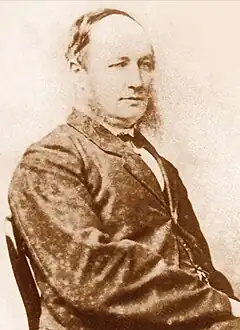 |
5 January 1840 | 9 May 1842 | none | ||
| 2 | Alexander Shepherd |  |
9 May 1842 | 7 May 1856 | |||
| 3 | Dillon Bell | 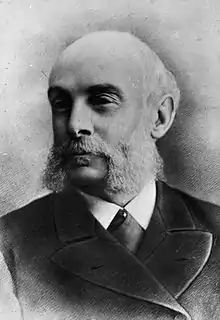 |
7 May 1856 | 20 May 1856 | Sewell | ||
| 4 | Charles Brown |  |
20 May 1856 | 2 June 1856 | Fox | ||
| 5 | Henry Sewell | 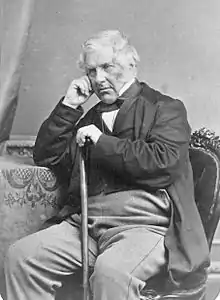 |
2 June 1856 | 4 November 1856 | Stafford | ||
| 6 | William Richmond | 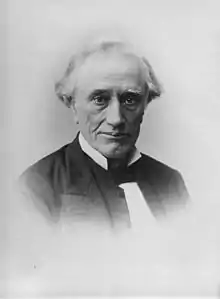 |
4 November 1856 | 25 February 1859 | |||
| (5) | Henry Sewell |  |
25 February 1859 | 26 April 1859 | |||
| (6) | William Richmond |  |
26 April 1859 | 12 July 1861 | |||
| 7 | Reader Wood | 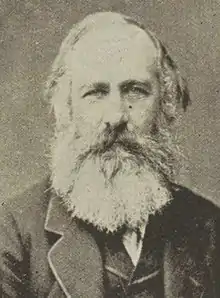 |
12 July 1861 | 6 August 1862 | Fox | ||
| (3) | Dillon Bell |  |
6 August 1862 | 21 August 1862 | Domett | ||
| (7) | Reader Wood |  |
21 August 1862 | 24 November 1864 | |||
| Whitaker | |||||||
| 8 | William Fitzherbert | 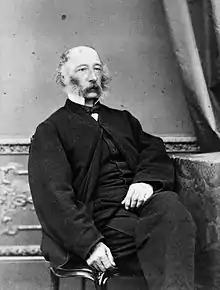 |
24 November 1864 | 16 October 1865 | Weld | ||
| 9 | Edward Stafford | 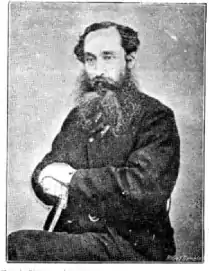 |
31 October 1865 | 12 June 1866 | Stafford | ||
| 10 | Francis Jollie | 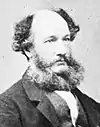 |
12 June 1866 | 24 August 1866 | |||
| (8) | William Fitzherbert |  |
24 August 1866 | 28 June 1869 | |||
| 11 | Julius Vogel |  |
28 June 1869 | 10 September 1872 | Fox | ||
| 12 | Thomas Gillies | 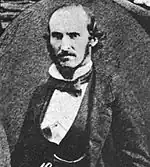 |
10 September 1872 | 11 October 1872 | Stafford | ||
| (11) | Julius Vogel |  |
11 October 1872 | 6 July 1875 | Waterhouse | ||
| Fox | |||||||
| Vogel | |||||||
| 13 | Harry Atkinson | 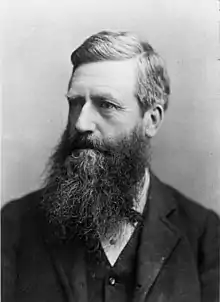 |
6 July 1875 | 15 February 1876 | Pollen | ||
| (11) | Julius Vogel |  |
15 February 1876 | 1 September 1876 | Vogel | ||
| (13) | Harry Atkinson |  |
1 September 1876 | 13 October 1877 | Atkinson | ||
| 14 | William Larnach | 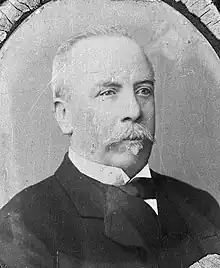 |
15 October 1877 | 5 March 1878 | Grey | ||
| 15 | John Ballance | 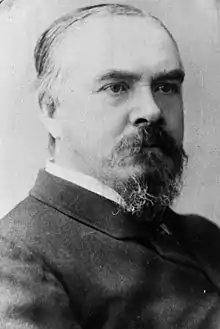 |
12 March 1878 | 1 July 1879 | |||
| 16 | George Grey | 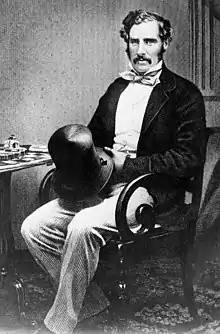 |
10 July 1879 | 8 October 1879 | |||
| (13) | Harry Atkinson |  |
8 October 1879 | 16 August 1884 | Hall | ||
| Whitaker | |||||||
| Atkinson | |||||||
| (11) | Julius Vogel |  |
16 August 1884 3 September 1884 |
28 August 1884 8 October 1887 |
Stout | ||
| (13) | Harry Atkinson |  |
8 October 1887 | 24 January 1891 | Atkinson | ||
| (15) | John Ballance |  |
24 January 1891 | 27 April 1893 | Ballance | ||
| 17 | Joseph Ward |  |
1 May 1893 | 16 June 1896 | Seddon | ||
| 18 | Richard Seddon | 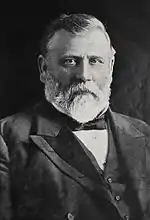 |
16 June 1896 | 10 June 1906 | |||
| 19 | William Hall-Jones | 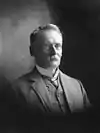 |
21 June 1906 | 6 August 1906 | Hall-Jones | ||
| (17) | Joseph Ward |  |
6 August 1906 | 28 March 1912 | Ward | ||
| 20 | Arthur Myers | 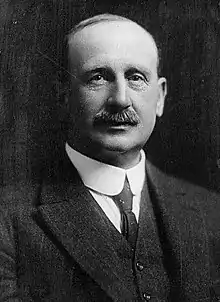 |
28 March 1912 | 10 July 1912 | Mackenzie | ||
| 21 | James Allen | 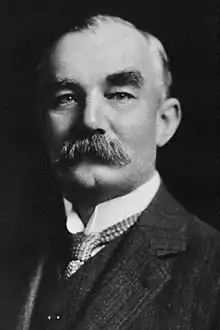 |
10 July 1912 | 12 August 1915 | Massey | ||
| (17) | Joseph Ward |  |
12 August 1915 | 21 August 1919 | |||
| (21) | James Allen |  |
4 September 1919 | 28 April 1920 | |||
| 22 | William Massey | 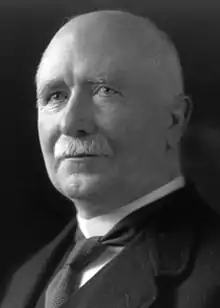 |
12 May 1920 | 10 May 1925 | |||
| 23 | William Nosworthy | 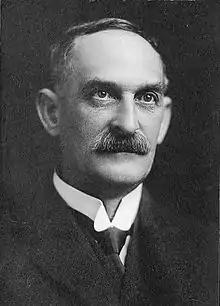 |
14 May 1925 | 24 May 1926 | Bell | ||
| Coates | |||||||
| 24 | William Downie Stewart Jr | 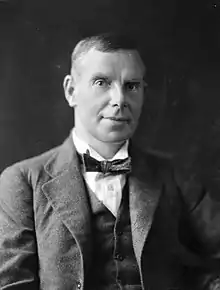 |
24 May 1926 | 10 December 1928 | |||
| (17) | Joseph Ward |  |
10 December 1928 | 28 May 1930 | Ward | ||
| 25 | George Forbes | 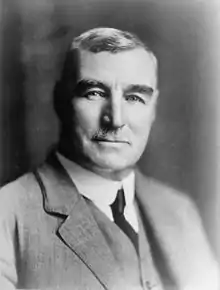 |
28 May 1930 | 22 September 1931 | Forbes | ||
| (24) | William Downie Stewart Jr |  |
22 September 1931 | 28 January 1933 | |||
| 26 | Gordon Coates |  |
28 January 1933 | 6 December 1935 | |||
| 27 | Walter Nash | .jpg.webp) |
6 December 1935 | 13 December 1949 | Savage | ||
| Fraser | |||||||
| 28 | Sidney Holland | _2.png.webp) |
13 December 1949 | 26 November 1954 | Holland | ||
| 29 | Jack Watts | 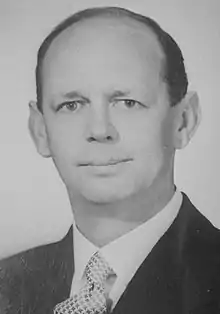 |
26 November 1954 | 12 December 1957 | |||
| Holyoake | |||||||
| 30 | Arnold Nordmeyer | .jpg.webp) |
12 December 1957 | 12 December 1960 | Nash | ||
| 31 | Harry Lake | 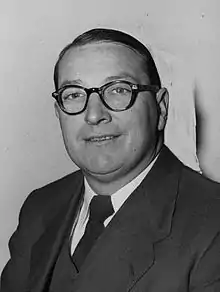 |
12 December 1960 | 21 February 1967 | Holyoake | ||
| 32 | Robert Muldoon | 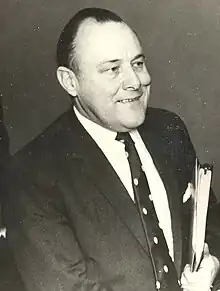 |
4 March 1967 | 8 December 1972 | |||
| Marshall | |||||||
| 33 | Bill Rowling |  |
8 December 1972 | 6 September 1974 | Kirk | ||
| 34 | Bob Tizard | 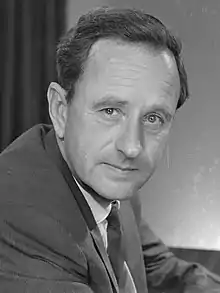 |
6 September 1974 | 12 December 1975 | Rowling | ||
| (32) | Robert Muldoon |  |
12 December 1975 | 26 July 1984 | Muldoon | ||
| 35 | Roger Douglas | 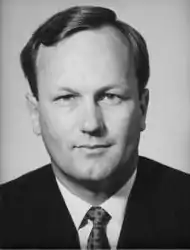 |
26 July 1984 | 14 December 1988 | Lange | ||
| 36 | David Caygill |  |
14 December 1988 | 2 November 1990 | |||
| Palmer | |||||||
| Moore | |||||||
| 37 | Ruth Richardson | .tif.png.webp) |
2 November 1990 | 29 November 1993 | Bolger | ||
| 38 | Bill Birch |  |
29 November 1993 | 1 February 1999 | |||
| Shipley | |||||||
| 39 | Bill English |  |
1 February 1999 | 22 June 1999 | |||
| (38) | Bill Birch |  |
22 June 1999 | 10 December 1999 | |||
| 40 | Michael Cullen |  |
10 December 1999 | 19 November 2008 | Clark | ||
| (39) | Bill English |  |
19 November 2008 | 12 December 2016 | Key | ||
| 41 | Steven Joyce |  |
12 December 2016 | 26 October 2017 | English | ||
| 42 | Grant Robertson | .jpg.webp) |
26 October 2017 | Incumbent | Ardern | ||
| Hipkins | |||||||
List of Treasurers
- Key
| No. | Name | Portrait | Term of Office | Prime Minister | |||
|---|---|---|---|---|---|---|---|
| 1 | Winston Peters | 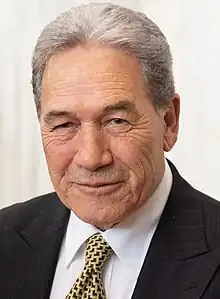 |
16 December 1996 | 14 August 1998 | Bolger | ||
| Shipley | |||||||
| 2 | Bill Birch |  |
14 August 1998 | 22 June 1999 | |||
| 3 | Bill English |  |
22 June 1999 | 10 December 1999 | |||
| 4 | Michael Cullen |  |
10 December 1999 | 15 August 2002 | Clark | ||
References
- "Parliamentary Salaries and Allowances Determination 2016" (PDF). Parliament.nz. Retrieved 20 January 2017.
- Clifton, Jane (19 September 2013). "Influentials: Politics". New Zealand Listener. Retrieved 15 November 2013.
- "Ministerial List". Department of the Prime Minister and Cabinet. Retrieved 14 June 2022.
- "Ministerial Portfolio: Finance". Department of the Prime Minister and Cabinet (DPMC). The Department of the Prime Minister and Cabinet. Retrieved 29 December 2017.
- Cyclopedia Company Limited (1897). "Mr. George Cooper". The Cyclopedia of New Zealand : Wellington Provincial District. Wellington. Retrieved 12 June 2010.
{{cite book}}: CS1 maint: location missing publisher (link) - Wood, G.A., ed. (1996). Ministers and Members in the New Zealand Parliament (2nd ed.). Dunedin: University of Otago Press. ISBN 1-877133-00-0.
- Easton, Dr Brian (1997). The Commercialisation of New Zealand. Auckland: University of Auckland Press. p. 74. ISBN 1869401735.
- Spanhake, Craig, ed. (2006). Ministers and Members in the New Zealand Parliament: 1996-2005. Dunedin: Tarkwode Press. ISBN 0-9597868-2-1.